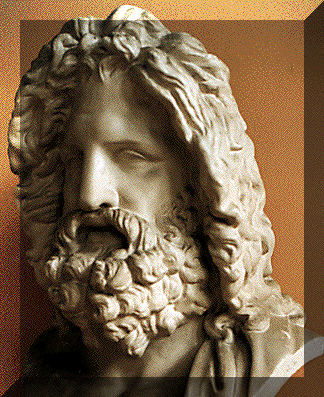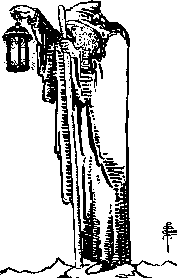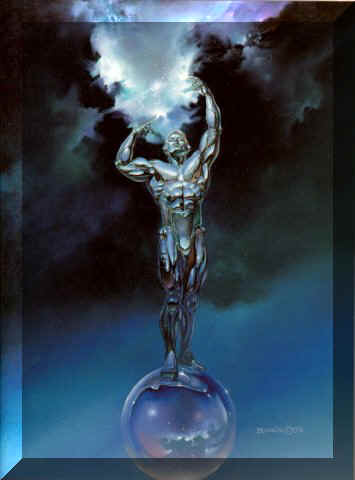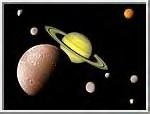 |
||||||
|
What is in store for us as we enter into the new millennium and into the Age of Aquarius? Focus is on the three most outer planets - Uranus, Neptune, and Pluto. These outer planets take the longest to complete one revolution around the Sun and their energies have deep and far-reaching effects. The long stay results in creating disruption, challenges, and conflict.
Uranus moved into Aquarius in 1996 where it will remain until 2003. It can oversee great expanses in all directions and from this vantage point, it can see those seemingly unconnected parts that are truly part of a greater pattern. Because Uranus is considered a "sky" god, (thinking realm) it is emotionally detached. It does not care if something or someone is in the way and will often sever the tie to move in a new direction, burning its bridges behind quite impulsively . . . many times regrettably as an afterthought. The Aquarian energy challenges us to question the prevailing mythology of the community . . . of mainstream. The intent is to push us to liberate ourselves from all pre-existing conditions that block evolution. Each of us is urged to express our unique individuality which contributes to the greater pattern of the community. Therefore, we may expect a an escalation of focus on worldwide social issues, such as global warming, responsible use of cyberspace, communicable diseases, and environmental resources. Technology will advance - especially in computer innovations.
Neptune moved into Aquarius early 1998 and will be there until 2012. Neptune rules the ocean. The planet is gaseous and foggy, seemingly formless and boundary less. Discovered in 1846, it has a strong gravitational effect on Uranus. Similarly, Neptune's effect on us is felt indirectly, through cracks in the ego, through dream states, and visions. Neptune rules those experiences that create a feeling of oneness, harmony, or connection with the greater whole. It urges us to let go of logic and tune into intuition. It challenges us to go beyond that boundary between ego and soul, between conscious and unconscious and to be receptive to those concepts that are beyond "reality". Neptune represents the mood of reality, the vibrations of the time, the assumptions about reality in the given era. Each age has its own "vibe". There will be new levels of consciousness, sensitivity, and awareness. It will exert its vibration and have a profound effect on art, literature, science, and music.
Pluto is in the sign of Sagittarius and will remain there until 2008. When transiting Pluto makes contact with trigger points in your chart, you are being challenged to ask yourself, "what have I hidden in the darkest crevices of my unconscious?" Pluto is a harsh taskmaster and expects truth. The underlying intent of this harsh, cold confrontation with truth is to challenge us to choose the deeper destiny we each have.
The presence of both Uranus and Neptune in the sign of Aquarius at the same time provides a powerful preparation for the Age of Aquarius which represents the development of self-hood itself against a backdrop of humanity. Uranus urges the active individuation; Neptune subtly encourages the beingness of the individual's unique consciousness. The combination urges us to accept ourselves as creative pieces of the pattern, where each piece is truly unique and absolutely necessary to create the whole.
The combination of two transpersonal planets in Aquarius and one in Sagittarius at the same time is unique in history for the past few thousands of years. At the beginning of the sign Pisces, two thousand years ago, existed a period that covered much of the life, death & resurrection of Jesus. Around 1000 AD, when the same planetary combination was in force, the "real" first discovery of North America by Leif Eriksson resulted. Five hundred years later, at the time of the Renaissance, the pattern again appeared ushering in an entirely new way of life. The old ways broke down completely, creating space in human consciousness for unique, expansive, creative thinking, dreaming and inventiveness. Humanity had choices regarding clinging to the old ways or moving on with a new spirit of hope, adventure and curiosity.
We are currently faced with the same choice . . . we are truly living in a uniquely powerful time. Certainly it is something to give serious thought to.
|
||||||
|
|
Saturn constitutes one of the most complex archetypes in the astrological mandela. It is the archetypal taskmaster among the planets. Darkness, doom, disease, and delay are all laid upon Saturn's shoulders. However, Saturn was also the ruler of the mythological Golden Age, and his benefits may be greater - or at least more substantial - than those of any other planet. Saturn often appears as a significator of the "father" in Astrology. A domineering Saturn in a natal horoscope may indicate the all-consuming father who seeks to mold his children in his own image and force them to live according to his standards. Saturn represents our limitations which are symbolized in various ways. When we attempt to transform Saturn from tyrant to mentor, we encounter these limitations, both material and psychological. Our repressed instincts, our dark recesses of the soul, all come up for review. As he transits each house in the horoscope, Saturn may indeed induce in us a state of depression in that area the house represents - a state of mind in which we feel truly confined in endless darkness. Saturn is associated with karma and there is no escape from the energies. One must address the issues.
Because Uranus was discovered during the American and French Revolutions in 1781, it has been correlated with freedom, independence, and a revolutionary or rebellious nature. Uranus, the "different planet" orbits on its belly at a 90 degree angle from the way everything else in the solar system behaves. Uranus is the iconoclast, the divine rebel; he is also the creative power of human will. Uranus has become the carrier for the archetype of Prometheus. In a birth chart, Uranus has been equated with an individual's social rebelliousness and has been credited with a talent for scientific invention. Uranus' urge for freedom may be expressed on an internal level rather than through a lifestyle. The incredible loneliness and isolation that overwhelms us is when our Promethean spirit is at last fully awakened.
Contact with the great ocean of the collective unconscious, the eternal storehouse of images and dreams, may bring forth psychic earthquakes and sweep us into the stormy realm of Neptune (Poseidon). In general, Astrologers perceive Neptune as a soft, almost feminine planet. Neptune appears strongly in the horoscopes of idealists, musicians, painters, dancers as well as alcoholics, drug addicts, therapists, and those who follow a spiritual vocation. Whether we observe Neptune's rulership over drugs and alcohol, the oil industry or even our addiction to spiritual attainment, everyone seems to be seeking some form of Neptune these days. The typical Neptunian is otherworldly, his/her vision tuned to an inner reality which may create fantasy castles that delight the multitudes. Dissolution is very prominent during a Neptune transit at certain stages of life when we have become too full of ourselves or our attachments to material pursuits. In mundane astrology Neptune governs earthquakes, hurricanes, and tidal waves and oil spills and will unleash his primal rage and emotional intensity upon the earth and sea when emotions and instincts are not allowed to exist above ground or when they are not released at proper intervals.
When Pluto was discovered in 1930, the world was embarking upon another crisis. This period of time was the darkest hour of the 20th century. The U.S. was in the grips of a severe depression so great that people were jumping off buildings because they had lost their fortunes. In Europe the age of the dictator was in full swing; Hitler, Mussolini and Franco and their dark armies evoked terror. Gangsterism in both America and Europe was on the rise and the Mafia bosses were implementing their own brand of terrorism. In the scientific arena the atom bomb, made from plutonium, was in its early stages. And one more Plutonian element emerged from the depths of the underworld - depth psychology and the psychoanalytic process was in its heyday with Freud (Plutonian sexuality), Adler (Plutonian power drive), and Jung (Plutonian transformation) as key spokesmen. Pluto the planet was quickly assigned to the ruler ship of Scorpio since both planet and sign have underworld affinities. A strong Pluto typically shapes an intense brooding kind of person; more often than not - an introvert. Such an individual is likely to be focused on the things which constitute symbols of power in our culture - sex, money, and power itself. They are motivated primarily by the unconscious, for this is Pluto's realm.
for additional information on the planets visit |
|||||





